Case Law Details
Simbhaoli Power Pvt Ltd Vs PCIT (ITAT Delhi)
ITAT Delhi held that revisional jurisdiction u/s. 263 of the Income Tax Act not invocable in absence of any error or infirmity in the assessment order which could make the assessment order erroneous and prejudicial to the interest of revenue.
Facts- Vide the present appeals, the appellant has mainly challenged the assumption of jurisdiction u/s. 263 of the Income Tax Act.
Conclusion- Held that where there are two possible views and the Assessing Officer has taken one of the possible views, no action to exercise powers of revision can arise, nor can revisional power be exercised for directing a fuller enquiry to find out if the view taken is erroneous. This power of revision can be exercised only where no enquiry, as required under the law, is done.
Held that it is an undisputed fact that the assessee is subsidiary of listed company, which means that the assessee is a subsidiary of a company in which public are substantially interested. Therefore, provisions of section 56(2)(vii)(b) do not apply to the assessee. Therefore, all the apprehensions raised by the PCIT for assuming jurisdiction u/s 263 of the Act are futile and without any backing of any provisions of the Act.
FULL TEXT OF THE ORDER OF ITAT DELHI
The above captioned two separate appeals by the assessee are preferred against two separate orders of the PCIT, Ghaziabad and Meerut dated 22.03.2019 and 08.03.2021 pertaining to A.Ys. 2014-15 and 201 5-16.
2. In both these appeals, the assessee has challenged the assumption of jurisdiction u/s 263 of the Income-tax Act, 1961 [the Act, for short] by the respective PCITs in respective A.Ys.
3. Since the underlying facts in the issues are identical in both these appeals, they were heard together and are disposed of by this common order for the sake of convenience and brevity.
4. Representatives of both the sides agreed to address the bench on the facts of ITA No. 4620/DEL/2019 for A.Y 201 4-15.
5. Representatives of both the sides were heard at length. Case records carefully perused. Relevant documentary evidence brought on record duly considered in light of Rule 18(6) of the ITAT Rules.
6. Briefly stated, the facts of the case are that the assessment for A.Y 2014-15 was framed u/s 143(3) of the Act vide order dated 22.12.2016. Assuming jurisdiction conferred upon him by provisions of section 263 of the Act, the PCIT issued show cause notice to the assessee which reads as under: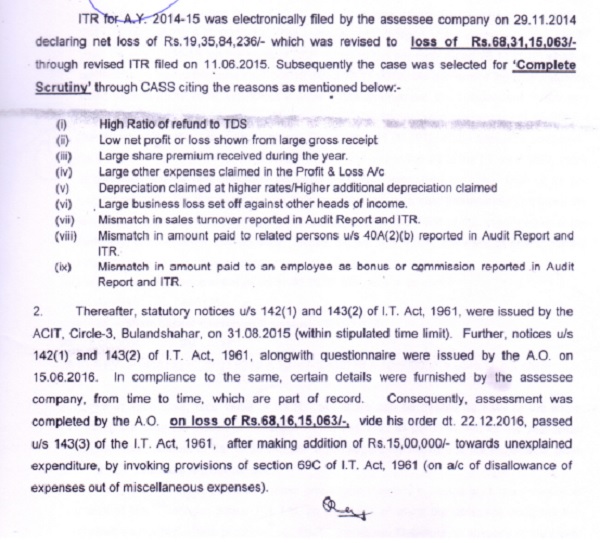
–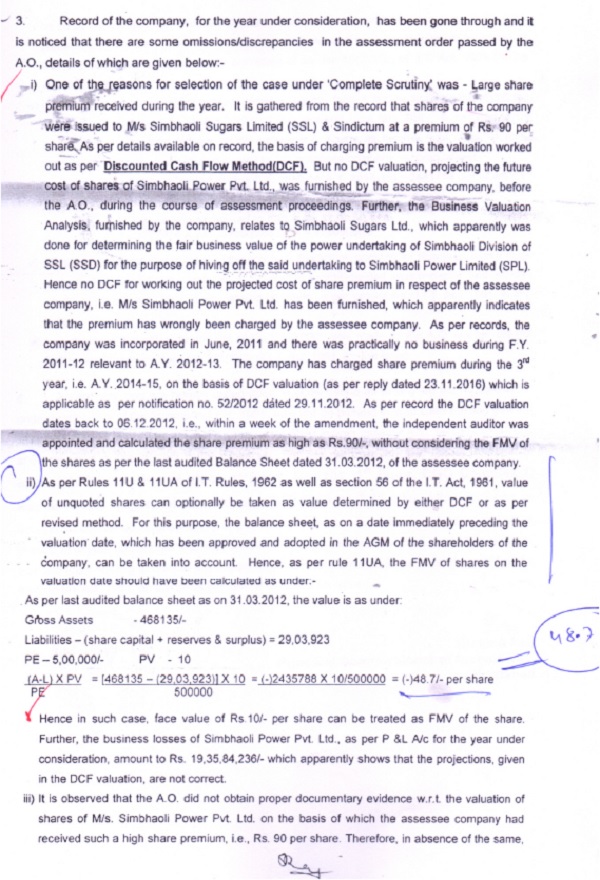
–
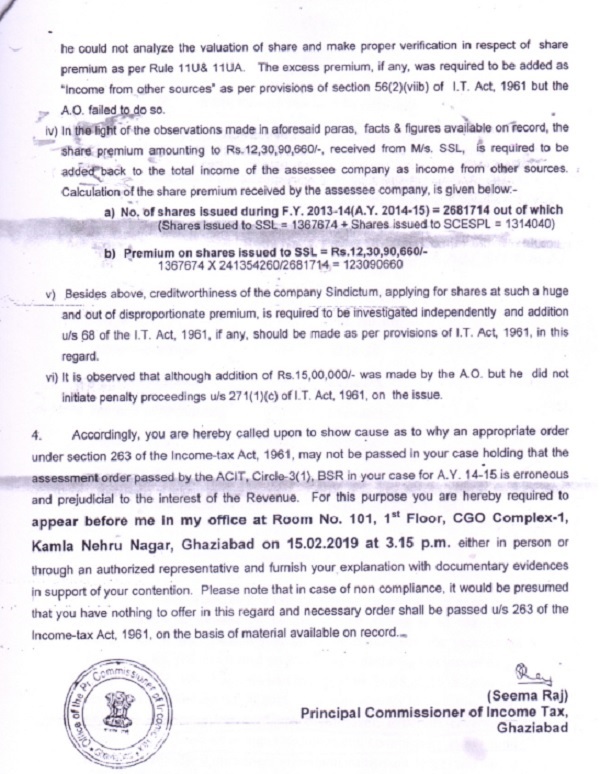
7. The assessee filed detailed reply to the queries raised by the PCIT with supporting documentary evidences which were considered by the PCIT and the PCIT finally completed the proceedings by observing as under:
“10. It is not necessary for the Commissioner to make further enquiries before cancelling the assessment order of the AO. The Commissioner can regard the order as erroneous on the ground that in the circumstances of the case the AO. should have made assessee in its’ return. The reasons are obvious. Unlike the Civil Court which is neutral to give decision on the basis of evidence produced before it. an A.O. is not only an adjudicator but is also an investigator. He cannot remain passive in the face of a return which is apparent in order but calls for further inquiry. It is his duty to ascertain the truth of the facts stated in the return when the circumstances of the cases are such as to provoke inquiry. The meaning to be given to the word “erroneous” in section 263 of the I.T. Act. 1961, emerges out of this context. The word “erroneous” in that section includes cases where there has been a failure to make the necessary inquiries (Gee Vee Enterprises Vs. Addl. CIT (1975) 99 IYT375, 386(Oel.).
11. It is incumbent on the officer to investigate the facts stated in the return, when circumstances would make such an enquiry prudent and the word “erroneous’ in section 263 of the I. T. Act, 1961. includes the failure to make such an inquiry. The order becomes erroneous because such an inquiry has not been made and not because there is anything wrong with the order if all the facts stated therein are assumed to be correct.
Ouggal and Company Vs. CIT,(1996) 220 ITR 456, 459 (Del.)
CIT Vs. Pushpa Oevi (1987) 1641TR 639 (Pat.)
Swaroop Vegetable Products Industries Ltd., Vs. CIT (All.) 1871TR 412
CIT Vs. Smt. Rambha Oevi (1987) 1641TR 658 (Pat.)
CIT Vs. Bela Nisa (1988) 1711TR 643 (Pat.)
CIT Vs. Smt. Kaushalya Oevi (1988) 1711TR 686 (Pat.)
CfT Vs. United Commercial Bank (1993) 201 ITR 162 (Gal.)
Jubilant Organosys Vs. CIT (2004) 2651TR 4201137 Taxman 515 (All.).
Malabar Industrial Co. Ltd. Vs. CIT (2000) 109 Taxman 6612431TR 83 (SC)
CIT Vs. McMilon and Company (SC) 33 ITR 182
Lajjawati Singhal Vs. CIT (All.) 226 ITR 527
12. In .view of the aforesaid discussion, it is found that the order passed by the A.O. is erroneous as well as prejudicial to the interest of the Revenue on the issues discussed in aforesaid paragraphs. Hence, the assessment order passed by the ACIT, Circle-3, Bulandshahr, u/s143(3) of I.T. Act, 1961. on 22.12.2016 is hereby set-aside on the issues mentioned above with a direction that a fresh order, passed by the ACIT, Circle-3, Bulandshahar, expeditiously in the light of ~~oc: v/s of I. T. Act 1961, and observations of the undersigned made in aforesaid.
6. We have given thoughtful consideration to the notice of the PCIT and the conclusions of the PCIT. All that we have to see is whether the Assessing Officer has made proper enquiry for the impugned issues as mentioned by the PCIT in his notice/order.
7. The first questionnaire u/s 142(1) of the Act regarding scrutiny assessment proceedings for A.Y 2014-15 is dated 02.11.2016 and the same reads as under: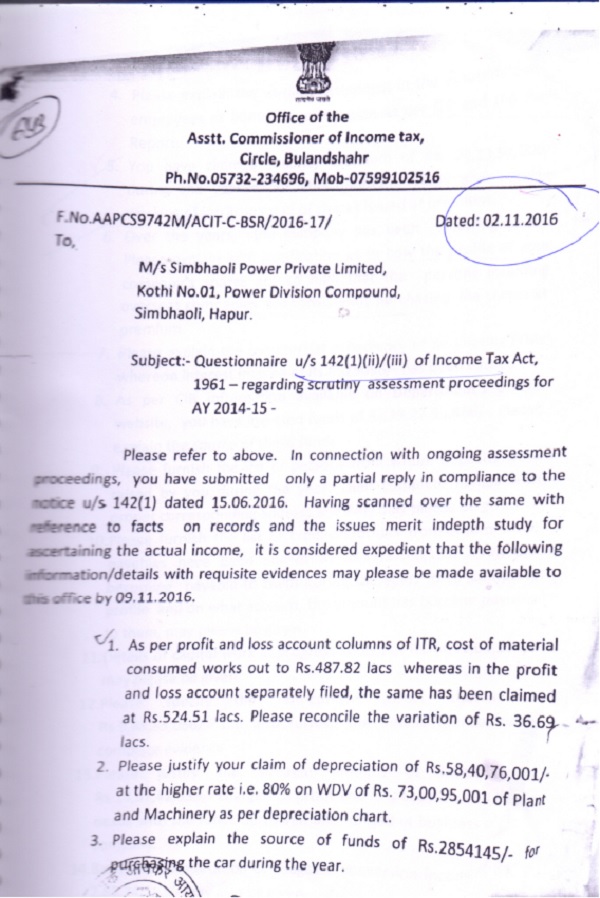
–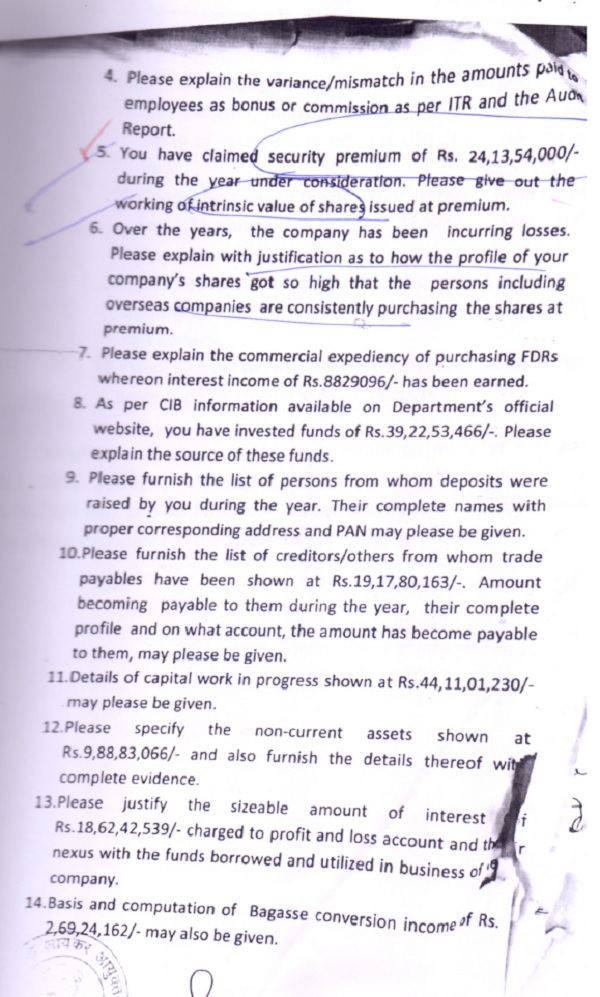
–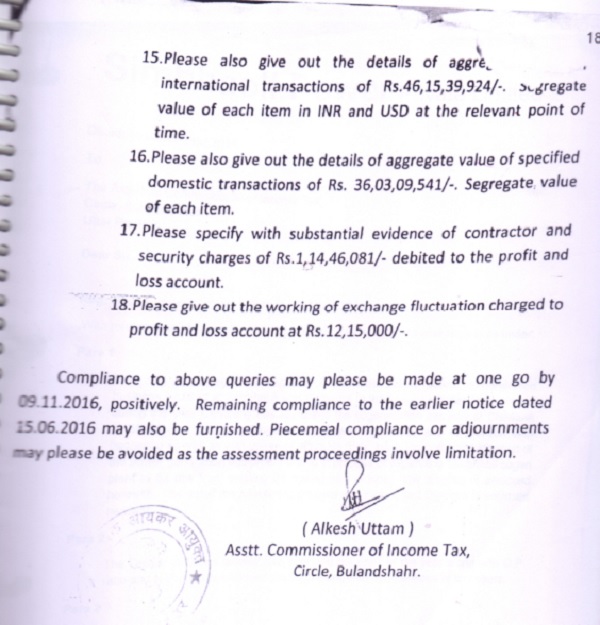
8. Question Nos. 5 and 6 above are most relevant for the issue under consideration. The assessee filed a detailed reply vide reply dated 23.11.2016 and specific mention to questions 5 and 6 is as under:
“Para 5 – The share was valued on the basis of discounted cash flow method. The copy of share valuation is attached for your reference.
Para 6 – This was the second year of the company and the company having only two share holders are Joint Venture Partner in this company. The shares were issued to Joint Venture Partner on the basis of Business Transfer Agreements. The value of share was decided on the basis of Discount Cash Flow method under the provisions of Income-tax Act.”
9. Vide letter dated 15.06.2016, section questionnaire was issued by the Assessing Officer which reads as under: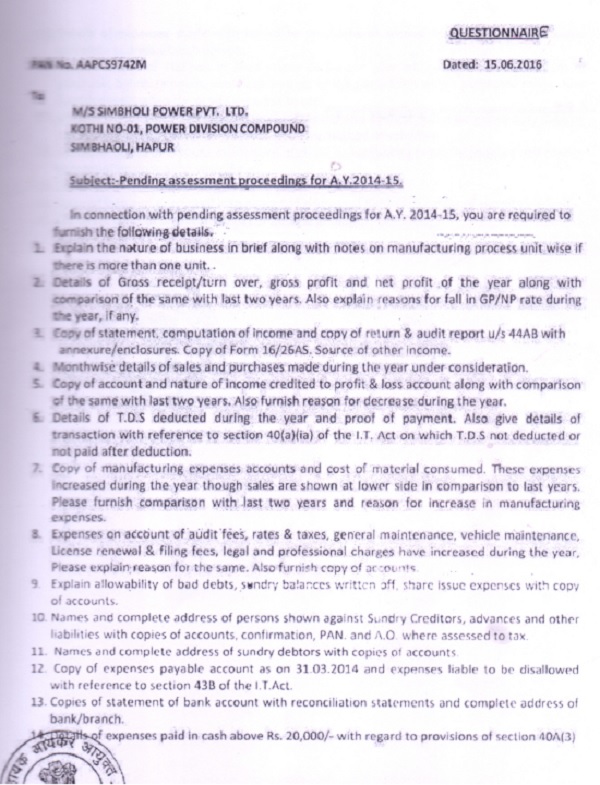
–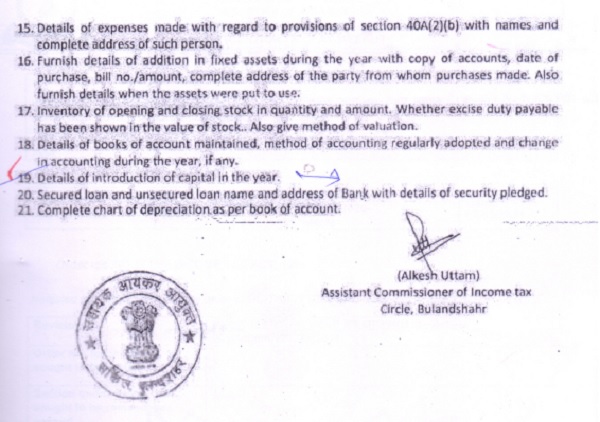
10. A detailed reply was filed by the assessee. From the above, it is crystal clear that specific queries were raised by the Assessing Officer during the course of assessment proceedings to which specific replies were furnished by the assessee. Therefore, it cannot be said that the Assessing Officer did not make any enquiry.
11. A perusal of the assessment order read with the questionnaire shows that the Assessing Officer has made enquiries in respect of security premium and had sought explanation for working of intrinsic value of shares issued at premium and also sought clarification from the assessee that since it is incurring losses, then how overseas companies are consistently purchasing shares at high premium.
12. A perusal of the assessment order clearly shows that the Assessing Officer has made enquiry in respect of capital gains. In the light of the afore-stated facts the Hon’ble Supreme Court in Malabar Industrial Co. Ltd., 243 ITR 83, has laid down the following ratio:
“A bare reading of section 263 of the Income-tax Act, 1961, makes it clear that the prerequisite for the exercise of jurisdiction by the Commissioner suo motu under it, is that the order of the Income-tax Officer is erroneous in so far as it is prejudicial to the interests of the Revenue. The Commissioner has to be satisfied of twin conditions, namely, (i) the order of the Assessing Officer sought to be revised is erroneous; and (ii) it is prejudicial to the interests of the Revenue. If one of them is absent–if the order of the Income-tax Officer is erroneous but is not prejudicial to the Revenue or if it is not erroneous but is prejudicial to the Revenue– recourse cannot be had to section 263(1) of the Act. The provision cannot be invoked to correct each and every type of mistake or error committed by the Assessing Officer, it is only when an order 7 is erroneous that the section will be attracted. An incorrect assumption of facts or an incorrect application of law will satisfy the requirement of the order being erroneous “.
13. The Hon’ble Bombay High Court in the case of Gabriel India Ltd 203 ITR 108 has held as under:
“The power of suo motu revision under subsection (1) is in the nature of supervisory jurisdiction and the same can be exercised only if the circumstances specified therein exist. Two circumstances must exist to enable the Commissioner to exercise power of revision under this sub-section, viz., (i) the order is erroneous; (ii) by virtue of the order being erroneous prejudice has been caused to the interests of the Revenue. It has, therefore, to be considered firstly as to when an order can be said to be erroneous. We find that the expressions “erroneous”, “erroneous assessment” and “erroneous judgment” have been defined in Black’s Law Dictionary. According to the definition, “erroneous” means “involving error; deviating from the law”. “Erroneous assessment” refers to an assessment that deviates from the law and is, therefore, invalid, and is a defect that is jurisdictional in its nature, and does not refer to the judgment of the Assessing Officer in fixing the amount of valuation of the property. Similarly, “erroneous judgment” means “one rendered according to course and 8 practice of court, but contrary to law, upon mistaken view of law; or upon erroneous application of legal principles”.
12. From the aforesaid definitions it is clear that an order cannot be termed as erroneous unless it is not in accordance with law. If an Income-tax Officer acting in accordance with law makes a certain assessment, the same cannot be branded as erroneous by the Commissioner simply because, according to him, the order should have been written more elaborately This section does not visualise a case of substitution of the judgment of the Commissioner for that of the Income-tax Officer, who passed the order unless the decision is held to be erroneous. Cases may be visualised where the Income-tax Officer while making an assessment examines the accounts, makes enquiries, applies his mind to the facts and circumstances of the case and determines the income either by accepting the accounts or by making some estimate himself. The Commissioner, on perusal of the records, may be of the opinion that the estimate made by the officer concerned was on the lower side and left to the Commissioner he would have estimated the income at a figure higher than the one determined by the Income-tax Officer. That would not vest the Commissioner with power to re-examine the accounts and determine the income himself at a higher figure. It is because the Income-tax Officer has exercised the quasi-judicial power vested in him in accordance with law and arrived at conclusion and such a conclusion cannot be termed to be erroneous simply because the Commissioner does not 9 feel satisfied with the conclusion. It may be said in such a case that in the opinion of the Commissioner the order in question is prejudicial to the interests of the Revenue. But that by itself will not be enough to vest the Commissioner with the power of suo motu revision because the first requirement, viz., that the order is erroneous, is absent. Similarly, if an order is erroneous but not prejudicial to the interests of the Revenue, then also the power of suo motu revision cannot be exercised. Any and every erroneous order cannot be the subject-matter of revision because the second requirement also must be fulfilled. There must be some prima facie material on record to show that tax which was lawfully exigible has not been imposed or that by the application of the relevant statute on an incorrect or incomplete interpretation a lesser tax than what was just has been imposed. We, therefore, hold that in order to exercise power under sub-section (1) of section 263 of the Act there must be material before the Commissioner to consider that the order passed by the Income-tax Officer was erroneous in so far as it is prejudicial to the interests of the Revenue. We have already held what is erroneous. It must be an order which is not in accordance with the law or which has been passed by the Income-tax Officer without making any enquiry in undue haste. We have also held as to what is prejudicial to the interests of the Revenue. An order can be said to be prejudicial to the interests of the Revenue if it is not in accordance with the law in consequence whereof the lawful revenue due to the State has not been realised or cannot be realised. There must be material available on the 10 record called for by the Commissioner to satisfy him prima facie that the aforesaid two requisites are present. If not, he has no authority to initiate proceedings for revision. Exercise of power of suo motu revision under such circumstances will amount to arbitrary exercise of power. It is well-settled that when exercise of statutory power is dependent upon the existence of certain objective facts, the authority before exercising such power must have materials on record to satisfy it in that regard. If the action of the authority is challenged before the court it would be open to the courts to examine whether the relevant objective factors were available from the records called for and examined by such authority. The Income-tax Officer in this case had made enquiries in regard to the nature of the expenditure incurred by the assessee. The assessee had given detailed explanation in that regard by a letter in writing. All these are part of the record of the case. Evidently, the claim was allowed by the Income-tax Officer on being satisfied with the explanation of the assessee. Such decision of the Income tax Officer cannot be held to be “erroneous” simply because in his order he did not make an elaborate discussion in that regard. Moreover, in the instant case, the Commissioner himself, even after initiating proceedings for revision and hearing the assessee, could not say that the allowance of the claim of the assessee was erroneous and that the expenditure was not revenue expenditure but an expenditure of capital nature. He simply asked the Income- 11 tax Officer to reexamine the matter. That, in our opinion, is not permissible. Hence the provisions of section 263 of the Act were not applicable to the instant case and, therefore, the commissioner was not justified in setting aside the assessment order.”
14. It is a settled position of law that powers u/s 263 of the Act can be exercised by the Commissioner on satisfaction of twin conditions, i.e., the assessment order should be erroneous and prejudicial to the interest of the Revenue. By ‘erroneous’ is meant contrary to law. Thus, this power cannot be exercised unless the Commissioner is able to establish that the order of the Assessing Officer is erroneous and prejudicial to the interest of the Revenue. Thus, where there are two possible views and the Assessing Officer has taken one of the possible views, no action to exercise powers of revision can arise, nor can revisional power be exercised for directing a fuller enquiry to find out if the view taken is erroneous. This power of revision can be exercised only where no enquiry, as required under the law, is done. It is not open to enquire in case of inadequate inquiry. Our view is fortified by the 12 decision of Hon’ble High Court of Bombay in the case of CIT vs. Nirav Modi, [2016] 71 Taxmann.com 272 (Bombay)”.
15. The Hon’ble High Court of Gujarat in the case of CIT vs. Nirma Chemical Works Ltd. 309 ITR 67 has observed as under:
“if assessment order were to incorporate the reasons for upholding the claim made by an assessee, the result would be an epitome and not an assessment order. In this case, during the assessment proceedings for both the Assessment Years, the Assessing . A.Y. 2009-10 Officer issued a query memo to the assessee, calling upon him to justify the genuineness of the gifts. The Respondent Assessee responded to the same by giving evidence of the communications received from his father and his sister i.e. the donors of the gifts along with the statement of their Bank accounts. On perusal, the Assessing Officer was satisfied about the creditworthiness/capacity of the donors, the source from where these funds have come and also the creditworthiness/ capacity of the donor. Once the Assessing Officer was satisfied with regard to the same, there was no further requirement on the part of the Assessing Officer to disclose his satisfaction in the Assessment Order passed thereon. Thus, this objection on the part of the Revenue cannot be accepted.”
16. We find that the Hon’ble Delhi High Court in the case of CIT Vs Sunbeam Auto reported in 332 ITR 167 has held as held as under:
“12. We have considered the rival submissions of the counsel on the other side and have gone through the records. The first issue that arises for our consideration is about the exercise of power by the CIT under s. 263 of the IT Act. As noted above, the submission of learned counsel for the Revenue was that while passing the assessment order, the AO did not consider this aspect specifically whether the expenditure in question was revenue or capital expenditure. This argument predicates on the assessment order, which apparently does not give any reasons while allowing the entire expenditure as revenue expenditure. However, that by itself would not be indicative of the fact that the AO had not applied his mind on the issue. There are judgments galore laying down the principle that the AO in the assessing order is not required to give detailed reason in respect of each and every item of deduction, etc. Therefore, one has to see from the record as to whether there was application of mind before allowing the expenditure in question as revenue expenditure. Learned counsel for the assessee is right in his submission 14 that one has to keep in mind the distinction between “lack of inquiry” and “inadequate inquiry”. If there was any inquiry, even inadequate that would not by itself give occasion to the CIT to pass orders under s. 263 of the Act, merely because he has different opinion in the matter. It is only in cases of “lack of inquiry” that such a course of action would be open”.
17. The facts of the appeal under consideration can be looked upon from a different angle. It is an undisputed fact that the assessee is subsidiary of listed company, which means that the assessee is a subsidiary of a company in which public are substantially interested. Therefore, provisions of section 56(2)(vii)(b) do not apply to the assessee. Therefore, all the apprehensions raised by the PCIT for assuming jurisdiction u/s 263 of the Act are futile and without any backing of any provisions of the Act.
18. Most importantly, the fact that share capital has been received from existing two share holders cannot be brushed aside lightly as the question of identity, capacity and genuineness of the transaction cannot be questioned.
19. The observations by the PCIT in A.Y 2014-15 that the assessee even if a subsidiary of a listed company cannot be considered as a deemed private limited company because the shares were not allotted unconditionally. This is nothing but a blatant remark of the PCIT without there being any demonstrative material evidence brought on record. Surprisingly, such observations are absent in A.Y 2015-16.
20. Considering the facts of the case from all possible angles in light of judicial decisions discussed hereinabove, we do not find any error or infirmity in the assessment order which could make it erroneous and prejudicial to the interest of the Revenue. Therefore, we set aside the order of the PCIT and restore that of the Assessing Officer dated 22.12.2016. We order accordingly.
22. In the result, the appeals of the assessee in ITA Nos. 4620/DEL/2019 and ITA No. 505/DEL/2021 aren allowed.
The order is pronounced in the open court on 05.01.2024.




